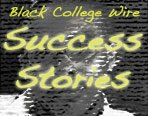| Wiley College Shares Spotlight With "Great Debaters" |  |
 |
 |
| By Kai Beasley - Black College Wire | |

wileyc.edu
Wiley College Thirkield Hall
"I think the film will have a great and positive impact," says Dr. Sally Malone Hawkins, a professor of sociology and chair for the college of arts and sciences at Wiley. "The students can have a better appreciation of where they are and where they are going. That's an important factor in making sure that the education at Wiley is competitive, that it can match any institution." 
chud.com
Jurnee Smollett, Nate Parker in "Great Debaters"
Washington reportedly will donate $1 million to the school to re-establish its debate team, according to several news sources. Under the leadership of poet and activist Melvin B. Tolson in 1935, the team beat the reigning debate champions, the University of Southern California, and went on to win the national title. "Melvin Tolson was a professor who had a zeal for learning," said Evelyn Bonner, Wiley's campus historian. "He was a dynamic and intellectual person, very knowledgeable and very controversial." Some of Tolson's most notable students were James Farmer Jr., who went on to found the Congress of Racial Equality, and Heman Marion Sweat, who in 1950 challenged racial segregation, after being denied admission to the University of Texas School of Law because he was African American. At that time, the state constitution prevented integrated education. The film, produced by Oprah Winfrey, was recently nominated for a Golden Globe for best picture and boasts a star-studded cast. Along with Washington, fellow academy award winner Forest Whitaker (The Last King of Scotland), Kimberly Elise (Diary of a Mad Black Woman), and Jurnee Smollett (Eve's Bayou) star in the picture. For Wiley students, the film offers more than just a night at the movies. "We appreciate what's going on right now," says Rene Cook, a junior, history major and member of the schools newly founded debate club. "It's something that needed to be done. This is history that you want to talk about." Between 1986 and 2003 the school has seen six different presidents, and its financial troubles have continued. It had a 2006-2007 enrollment of 862 and ended fiscal year 2006 with a $1 million dollar deficit. Terrence Baty, a senior English and Mass Communications major, hopes that the film will raise awareness about Wiley College. "I think it will actually give people a chance to know what Wiley is about," Baty says. "No one really knows about the school. We have a lot of accomplishments. I would hope that the film would make people want to give more to Wiley." Since the Civil Rights Act of 1964 provided students with the opportunity to attend any institution they want, Wiley, like many historically black colleges, saw its share of financial struggles as a result of declining enrollment. On Dec. 5, the New York Times reported that since 1954, only eight of the 11 black colleges in Texas remain. Of those remaining institutions, one is on academic probation and another operated through much of the 1990s without accreditation, according to the Times article. Wiley might have shut its doors in 1971 if it weren't for the efforts of Rev. Robert Hays, a Wiley alum who convinced town bankers not to call in loans owed by the school. "I know that the administration is working really hard to help fix those problems," says Baty. "When students come into the school and they don't pay back their loans, or whatever money they get from the school, it puts the school in debt." Wiley's financial woes have left the school unable to support a debate team, but the national attention that has come with the release of the film has renewed interest in debating for many students. "It died out for a long time," Cook says. "Then it started back again. I'm going to go ahead and say that it was because of the movie coming out. It has been something that has been a part of our history, but it just hasn't been so open and out there." While revival of the school's debate team is not official according to Hawkins, members of the faculty have begun implementing a program geared towards teaching the art of debate. "Formally, our debate program will be centered around courses teaching students how to debate," Hawkins says. "We have that planned to go off in spring of '08." In 2006, Hawkins coached a team of two selected students to victory in a debate at Morehouse College. The Association of Social and Behavioral Scientists sponsored the competition. Hawkins is the association's current president-elect and conference chair. Wiley's victory represented a brief return to its former glory. But Hawkins says that the official return of the school's debate team would require a lot more work. "I would have to say that it's in the planning stages right now," Hawkins adds. "We would have to put the teams through the rigors of debating before we could identify people who are ready to debate." Although the resurrection of Wiley's great debaters remains to be seen, the accomplishments of the 1935 team, and the message it sent to the country, still resonate with today's generation. "You will still have people that think that some people are superior to another", Bonner says. "But Wiley's debaters taught us that we only need to apply ourselves to what we want. We can do it. It's possible." Posted Dec. 19, 2007 |
|
| Posted Dec. 19, 2007 |
| < Prev | Next > |
|---|



